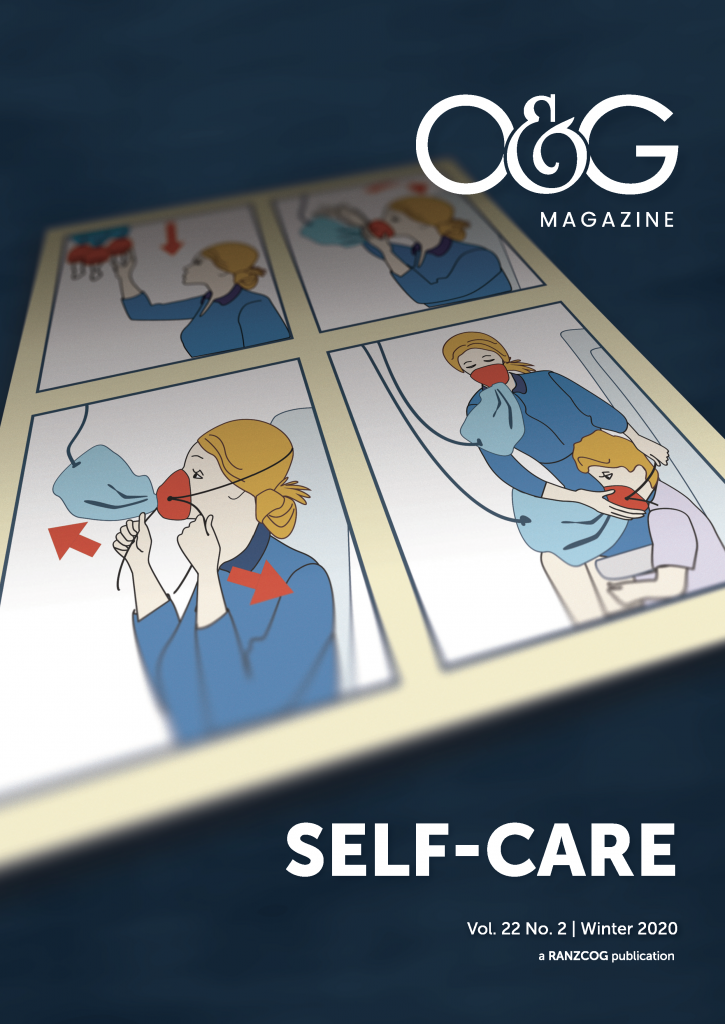Tanja: Prevocational O&G trainee
I believe that the majority of us would identify as having a healthy amount of ‘performance anxiety’; that feeling of increased vigilance that makes us take that one more step preparing for high-pressure exams or, as I have more recently experienced, college applications.
Having gone through the RANZCOG training application process last year I experienced a new level of pressure that I had not experienced before and my healthy level of ‘performance anxiety’ felt overwhelming at times and I had to adapt in order to get through.
There are some unique attributes to the application process. On a professional level, it marks developing as a doctor in O&G and learning new skills while committing to additional activities to optimise application requirements.
On a personal level, two features made this process further high pressure. I have wanted to do nothing more in my working life than pursue a career in O&G; there was no plan B. Especially in light of the maximum application attempts, it played on most of our minds: ‘this goal may not actually be achievable, and then what?’ In addition, the College application co-existed with raising a young family, and while prioritising the application process, other parts of life undoubtedly suffered, leading to a sensation of guilt.
During this process, I learned attributes of self-care that worked for me. I learned that planning ahead and having dialogues with my family about the weeks ahead could optimise sleeping, eating and exercise. I learned to find mentors in more senior colleagues who provided guidance and support. Lastly, during this process, I have engaged in mindfulness sessions facilitated by our department, which have been of great benefit professionally and personally.
Lauren: FRANZCOG trainee
It’s taken several years and a good dose of perspective to appreciate the importance of genuine self-care. I commenced training in 2017 and I was filled with enthusiasm and excitement. I’d worked hard to get onto the training program and I was looking forward to the challenges of O&G. I was happy working long hours and I loved being at the hospital, but outside of work, my normal life was starting to fall away.
Fast forward 12 months and I was struggling; exams loomed and the inevitable tragic outcomes had distressed me immensely. I didn’t share my anxiety with others, I didn’t want to seem weak. My mental health was pretty poor – but it’s only in retrospect that I can recognise that. I carried the poor outcomes that had happened at work with me always – like a weight in my chest, panicked that I would miss something and a family would be devastated. The responsibility of our job was a backpack full of bricks I could never take off.
It was only when I shared these feelings – at first quietly with a trusted colleague – that I realised I wasn’t alone in feeling this way. I learnt that it was only in sharing my experience that I could move forward from the paralysis of fear-based decisions. Our department hosted a consultant-led session focused on the biggest mistakes they had made in their career. I sat quietly listening to consultants I respected immensely, humbly share mistakes they’d made. These mistakes stayed with these doctors, the emotions heard as their voice caught in the back of their throat. But I learnt in that important session – that none of us are perfect, but we learn from one another and it’s in supporting each other that we care for one another.
Self-care is not glamourous. Genuine self-care is mundane, healthy habit-forming behaviour. It’s a sensible diet, regular exercise and good sleep hygiene. Self-care at work is proper debriefing, supportive conversations after adverse events and sharing your mistakes so we learn from one another (and so no one feels alone when they make a mistake). Learning these simple acts of self-care has improved my mental and physical health, and hopefully these habits will continue to hold me in a good place.
Supuni: Early career FRANZCOG
Great, training is finally over, your letters are in and you think you are sorted for life, right?
Wrong!
I was just at the beginning all over again, but at a completely new phase in life.
My mentors told me to start slow and steady and not to over-commit, which was great advice, but at odds with the concern of not being able to maintain acquired skills, clinical acumen and not have adequate exposure. The privilege of waltzing into filled operating lists and clinics packed with patients was not a given anymore but had to be sought. Diminishing time caring for, and listening to, patients while tackling bureaucracy and systematic inefficiencies were infuriating. Being responsible for all outcomes of your patients, even if it meant just having your name on a sticker, was daunting and anxiety-provoking. Driving into the hospital when you have been called in for a time-critical, challenging delivery is everything but a joyride and such were the trials and tribulations of a new consultant, to name a few.
As a consultant, you finally have the independence to shape your work-life balance to what you want it to be. Acknowledging and being honest about one’s limitations and boundaries (as a clinician, spouse, parent, child, friend), accepting that perfection is impossible, having compassion for yourself and reassurance that you are never (usually) on your own are essential for coping and enjoying the journey. Ultimately, caring for oneself is necessary to be able to care for others and retain the enthusiasm and fulfilment of working in the field of women’s health in the long journey that I have loved being a part of and intend to continue for a long time to come.
Greg: Later career FRANZCOG
Pressures change throughout our careers. On reflection, I have become more aware of pressure over the years and more attuned to the pressures I place on myself (e.g. my expectations) and also external pressures (e.g. public hospital electronic medical record systems!) of which I have much less control. I also more readily recognise pressures outside of work. I know that when I have a lot of personal life pressures, I do not manage work pressure as well as usual. Having a better understanding of my limitations means that I can choose to step back from high-pressure situations when I am feeling overwhelmed. I have also become more aware of the importance of developing adaptive strategies for managing pressure. For me, running, talking to friends/family/colleagues, mindfulness and adequate sleep (not always easy!) are mainstays. However, we all need to be vigilant for less adaptive strategies creeping into our lives (such as substance use, binge eating, risky behaviours).
Pressure is not the same as stress, according to the World Health Organization, when pressures become excessive this can lead to stress, which can then become detrimental to health and work performance. This can potentially lead to issues such as burnout and depression. The degree to which pressure is experienced will depend on factors such as whether work demands are matched to knowledge, skills, abilities and available time, and the degree of control the individual may or may not perceive. Support provided in the workplace, especially from colleagues and senior staff/supervisors, are also important.
Pressure is part of nearly all workplaces, but especially applies to medicine. We can think of burnout as one of the undesirable outcomes of the pressure/stress spectrum. A survey reporting high levels of burnout amongst obstetricians and gynaecologists should come as no surprise.1 Burnout comes with reducing productivity outcomes including academic output, reduction in clinical hours, use of sick leave and ultimately intent to change careers,2 as well as consequences in terms of health and wellbeing.
However, pressure in our workplaces should not been seen entirely as detrimental. If there is no pressure, we potentially become bored, inattentive and our work performance (and satisfaction) suboptimal. As work pressure increases, we reach an optimum point of performance, probably near the edge of our ‘comfort zone’ where we are stimulated and engaged, but not excessively stressed. If pressure continues to increase, we risk moving to a stress response situation with burnout and other adverse consequence likely to occur.
Pressure is important for our professional growth and development, it can, however, be detrimental. It is essential for us to be aware of the pressures in our lives and to recognise when pressure reaches the point at which it is detrimental. The pressures we are subjected to are sometimes within our control and sometimes not, and these pressures will change throughout our lives and our careers. It is important that we develop adaptive strategies for managing pressure as these will help us to flourish in both our professional and personal lives.
References
- Bourne T, Shah H, Falconieri N, et al. Burnout, well-being and defensive medical practice among obstetricians and gynaecologists in the UK: cross-sectional survey study. BMJ Open. 2019;9:e030968.
- Dewa CS, Loong D, Bonato S, et al. How does burnout affect physician productivity? A systematic literature review. BMC Health Serv Res. 2014;14:325.








Leave a Reply